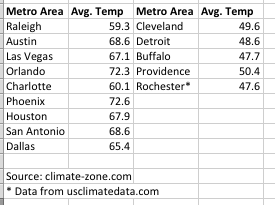The WSJ recently ran an editorial piece that perfectly exemplified two things:
- The (well-known) cognitive biases caused by the politics and intellectual dishonesty of its editorial board
- The peril of confusing correlation with causation, which BR has written about countless times*
In a piece titled The Red-State Path to Prosperity, Stephen Moore and Art Laffer argue that metropolitan migration nationwide is going from blue states to red states because “Workers and business owners are responding to clear economic incentives,” i.e. lower tax rates, less regulation, more employer-friendly. They state that:
Among the 10 fastest-growing metro areas last year were Raleigh, Austin, Las Vegas, Orlando, Charlotte, Phoenix, Houston, San Antonio and Dallas. All of these are in low-tax, business-friendly red states. Blue-state areas such as Cleveland, Detroit, Buffalo, Providence and Rochester were among the biggest population losers.
In an accompanying video, Mary Kissel opens the segment by stating: “So it turns out that tax rates do actually matter, according to the Census Bureau,” at which point she begins a conversation with the aforementioned Art Laffer about what he and Mr. Moore inferred from the data. (Census main page on migration is here.) The simple fact of the matter is that Census Bureau made no such claim; Ms. Kissel is distorting Census data and giving voice to it through the ideological lens of Mssrs. Moore and Laffer.
Now, before I proceed, let’s be clear on one point: It’s entirely possible that Mr. Moore and Mr. Laffer are on to something. Unfortunately, they offer up no evidence to support their thesis. (I’m assuming the migration to which they refer has actually occurred the way they describe it which, perhaps, could be a grievous error on my part.)
I’d note that Table 24 (Reason for Move of Movers 16 Years and Over, by Household Income in 2011, Labor Force Status, Major Occupation Group, Major Industry Group, and Type of Move (All Categories): 2011 to 2012) and Table 26 (Reason for Move of Movers 16 Years and Over, by Household Income in 2011, Labor Force Status, Major Occupation Group, Major Industry Group, and Type of Move (Collapsed Categories): 2011 to 2012) might have been of use to the authors, but they apparently weren’t aware of, or chose to ignore, actual data.
You see, with the data, we can find out why people have moved instead of simply guessing about it. Of course, in doing so, one runs the risk that the data don’t cooperate with your thesis, but that’s just me, a guy from the reality based side of the political spectrum. If you want to see what happens on this side of the street, various data tables are here.
Now, in the spirit of the Wall St. Journal editorial board, and performing the same rigorous analysis used by Moore and Laffer, I hereby advance my own thesis as to the reason for the migration patterns cited in their editorial:
WEATHER.
Yes, weather.
As we can see immediately below, average temperatures in the net-gaining areas surpass those of the net-losing areas 100 percent of the time. Every net-gainer has a higher average temp than every net loser. Let’s have a look at the areas they cite (see block quote above). Gaining areas are on the left, losers on the right:
Tax rates? Regulation? Right-to-work? Balderdash. Gimme some temperate climate. Gimme lower energy bills.
As with the Journal, I have engaged in a perfect logical fallacy:
A occurs in correlation with B
Therefore, A causes B
A bit of evidence would have been nice. Without it, all they did was fill column inches.
I hope to look more closely at this issue – via the actual data – and see what’s going on. I’ll even make a phone call or two to Census, so I know I’ve got my facts straight.
UPDATE: Some comments and email make it clear that my sarcasm apparently did not come across in print. To restate my main point, merely showing correlation ≠ causation. Maybe weather is a factor — we don’t know, but merely looking at correlation
* Previously:
Causation & Correlation: Gasoline vs. Incumbency (October 15th, 2004)
Context, Causation, Correlation (January 10th, 2012)
Hume, Causation & Science (January 14th, 2012)



What's been said:
Discussions found on the web: